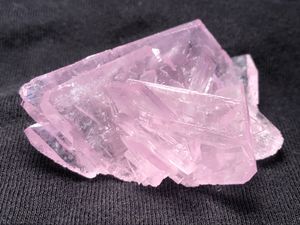Difference between revisions of "Manganese(II) sulfate"
(→Gallerʏ) |
|||
| Line 127: | Line 127: | ||
One involves the direct reaction of [[sulfuric acid]] with [[manganese]] metal: | One involves the direct reaction of [[sulfuric acid]] with [[manganese]] metal: | ||
| − | :H<sub>2</sub>SO<sub>4</sub> + Mn → MnSO<sub>4</sub> + H<sub>2</sub> | + | : H<sub>2</sub>SO<sub>4</sub> + Mn → MnSO<sub>4</sub> + H<sub>2</sub> |
This reaction however, does not work with [[manganese dioxide]], which is more available that manganese metal. There are a few ways around though: | This reaction however, does not work with [[manganese dioxide]], which is more available that manganese metal. There are a few ways around though: | ||
| Line 153: | Line 153: | ||
Manganese sulfate should be precipitated to manganese dioxide and then sent to waste disposal centers. Waste batteries centers might also pick up manganese waste. | Manganese sulfate should be precipitated to manganese dioxide and then sent to waste disposal centers. Waste batteries centers might also pick up manganese waste. | ||
| − | == | + | ==Gallery== |
| − | + | <gallery widths="300" position="center" columns="4" orientation="none"> | |
| − | + | MnSO4 1.jpeg|A large crystal of MnSO<sub>4</sub> | |
| − | + | MnSO4 3.jpg|Ditto | |
| + | MnSO4 2.jpeg|Crystal compared to a coin | ||
| + | Manganese(II) sulfate bottle sample.jpg|MnSO<sub>4</sub> sample and its original bottle. The sample is more pinkish in person. | ||
| + | </gallery> | ||
==References== | ==References== | ||
Latest revision as of 20:21, 20 March 2023
 Manganese(II) sulfate heptahydrate crystals
| |
| Names | |
|---|---|
| IUPAC name
Manganese(II) sulfate
| |
| Systematic IUPAC name
Manganese(II) sulfate | |
| Other names
Manganese sulfate
| |
| Identifiers | |
| Jmol-3D images | Image |
| |
| Properties | |
| MnSO4 | |
| Molar mass | 151.001 g/mol (anhydrous) 169.02 g/mol (monohydrate) 223.07 g/mol (tetrahydrate) 277.11 g/mol (heptahydrate) |
| Appearance | White solid (anhydrous) Pink crystalline solid (hydrated) |
| Odor | Odorless |
| Density | 3.25 g/cm3 (anhydrous) 2.95 g/cm3 (monohydrate) 2.107 g/cm3 (tetrahydrate) |
| Melting point | 710 °C (1,310 °F; 983 K) (anhydrous) 27 °C (80.6 °F; 300.15 K) (tetrahydrate) |
| Boiling point | 850 °C (1,560 °F; 1,120 K) (anhydrous) |
| 52 g/100 mL (5 °C) 70 g/100 mL (7 °C) | |
| Solubility | Soluble in ethanol, methanol Insoluble in diethyl ether, toluene |
| Hazards | |
| Safety data sheet | DoGEE (monohydrate) |
| Flash point | Non-flammable |
| Related compounds | |
| Related compounds
|
Chromium(III) sulfate Iron(II) sulfate |
| Except where otherwise noted, data are given for materials in their standard state (at 25 °C [77 °F], 100 kPa). | |
| Infobox references | |
Manganese(II) sulfate is the sulfate salt of manganese, with the formula MnSO4. Although the anhydrous salt is white, its hydrates are pinkish in color.
Contents
Properties
Chemical
Manganese(II) sulfate will precipitate as manganese hydroxide when mixed with a strong base, such as sodium hydroxide.
Physical
Manganese sulfate is a pinkish crystalline salt, soluble in water, as well as primary alcohols, though insoluble in aprotic solvents, such as benzene or diethyl ether. It is most often encountered as monohydrate form, though other hydrates, like tetrahydrate, pentahydrate, and heptahydrate also exist.
Availability
Manganese sulfate is sold by various chemical suppliers.
Manganese sulfate monohydrate is available as fertilizer and can be found in many gardening stores, or online.
Preparation
There are a few ways to make manganese(II) sulfate.
One involves the direct reaction of sulfuric acid with manganese metal:
- H2SO4 + Mn → MnSO4 + H2
This reaction however, does not work with manganese dioxide, which is more available that manganese metal. There are a few ways around though:
One way is to react manganese dioxide with oxalic acid and then react the resulting manganese oxalate/carbonate with dilute sulfuric acid.
A more conveninet method involves reacting sulfur dioxide with powdered manganese dioxide. This reaction can be achieved in two ways: bubbling sulfur dioxide in an aqueous suspension of manganese dioxide, while the other involves adding an aq. solution of sulfur dioxide (sold by winemaking suppliers) with manganese dioxide powder. Both reactions are exothermic, so the synthesis must be done outside or in a fumehood, since lots of sulfur dioxide will be produced as side product. After the reaction is complete, the solution must be filtered to remove the insoluble products.
- MnO2 + SO2 → MnSO4
You can also dissolve manganese alloys in sulfuric acid, however the resulting manganese sulfate will be contaminated with iron sulfate as well as other sulfates.
Projects
- Make very pure manganese dioxide (chemically or electrochemically)
- Source of manganese ions
Handling
Safety
Long-term exposure to manganese dust or compounds will lead to manganese poisoning, also known as manganism.
Storage
Manganese sulfate should be kept in closed plastic or glass bottles.
Disposal
Manganese sulfate should be precipitated to manganese dioxide and then sent to waste disposal centers. Waste batteries centers might also pick up manganese waste.
Gallery
References
Relevant Sciencemadness threads
- Chemical pages without CAS Registry Number
- Articles without EBI source
- Chemical pages without ChemSpiderID
- Chemical pages without DrugBank identifier
- Articles without KEGG source
- Articles without InChI source
- Articles without UNII source
- Articles containing unverified chemical infoboxes
- Chemical compounds
- Inorganic compounds
- Manganese compounds
- Sulfates
- Easily prepared chemicals
- Readily available chemicals



